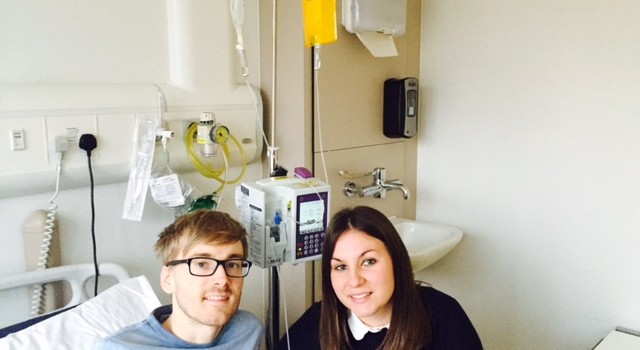Nivolumab

Nivolumab is the name of the cancer treatment I am having right now. Like Interleukin-2, it is a type of Immunotherapy, although unlike IL-2 it is not produced in the body. Instead, it is used to block a key tactic that cancer cells use to hide themselves from the body’s immune system.
One of the really annoying things that cancer cells do is to trick the body into believing they’re good decent cells that really don’t mean any harm at all. So brainy scientists are trying to come up with ways to tell the body that it’s being conned, and to show the true nature of cancer cells. The result is Nivolumab – a really, really new drug that has only recently come to the UK from America.
The body’s immune system consists of lots of cells, including T-cells, that act as a defence system against foreign cells like viruses or cancer. T-cells have a protein on their surface called PD-1 – and that’s where cancer comes in. Cancer cells can be smart enough to produce PD-L1 which, when locked on to the PD-1 protein makes T-cells completely ineffective.
Nivolumab’s role is to completely block the PD-1 protein on your body’s T-cells, enabling them to work effectively. Sounds simple enough, I think!
At the Christie, where I’m being treated, Nivolumab is given as a 60-minute infusion. I head back to the hospital every two weeks to have it done. It’s an easy process at the hospital’s day treatment centre.
There’s a long, long list of possible side effects – although the drug is so new that I’m not sure how many of them are legitimate. Anyway, for someone in my position – side effects are a necessary evil. Results are what matters most!
Nivolumab was in the national press and on national news recently after getting one of the fastest ever approvals from NICE for use on the NHS. It is being used with another immunotherapy drug, called Ipilimumab, for advanced cancers. I am not using the latter drug although trials for its effectiveness against kidney cancer are in progress, so it might be one for the future for someone like me. The theory is that these new drugs are strong on their own – but are twice as powerful when combined. This is thought to be the future of cancer treatment.
Click here for more information on the breakthrough.